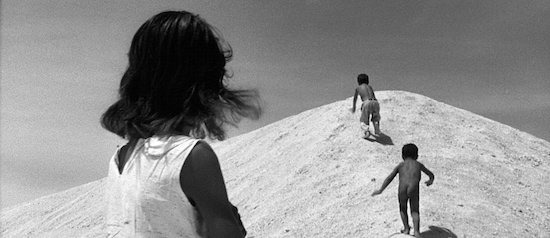
Araya. Courtesy of Milestone Films
SERIES
Some Other Lives of Time: Subjective Spaces for Nonfiction
November 8–10, 2019 Organized by RaMell Ross
The question may feel almost irritatingly unanswerable. But only to certain readers. To others it invites consideration of the medium knowing that words will fail. That words should fail. Especially if you pull cinema off the assembly line and into the scaffolding of the comfortably unknown. Permission then, to wax on. Let the question wade into your stream of consciousness and see what debris it attracts as it filters memories and prose. Half verbs and faint instances. An undertow that itself is the entire state of things. And then, something part reason appears, and you follow: If when a person is born, so is a new life of time, then perhaps cinema is its anagram. Some other life of time that suggests the complexity of our astronomical-industrial social situation without the stifling grammar and logic of written language. Best then, maybe, is the nonfiction/documentary invitation—for jarring one’s beliefs, introducing possible ways of seeing, and sweet-talking self-righteousness. There is cinematic opportunity in the idea of truth; a safe space afforded by a hand-shake from yesteryear to access the mind behind its security guard. Here in the nonfiction imaginary, these films, ad hoc and flexible, their subjectivity craftily reorganized, live their lives. Yes, the screen, some other life of time. That sounds right. A reality-based lullaby outgrowth of our funny bodies’ strange constitution in this civilized grind. Personal time to personal truth.
Film descriptions by Sadie Tillery, Artistic Director, Full Frame Documentary Film Festival.
About the Full Frame Documentary Film Festival:
Full Frame is a four-day international event dedicated to the theatrical exhibition ofnonfiction cinema. The intimate festival landscape in downtown Durham, North Carolina, fosters community and conversations among filmmakers, film professionals, and the public. Full Frame is a program of the Center for Documentary Studies at Duke University. The 23rd annual festival will take place April 2–5, 2020. Its annual Thematic Program showcases retrospective titles, giving audiences the opportunity to view older work alongside the contemporary selections featured in the festival’s NEW DOCS and Invited Programs.
Acclaimed photographer and filmmaker RaMell Ross (Hale County This Morning, This Evening) recently programmed this screening series for the 2019 Full Frame Documentary Film Festival, where it was presented as the festival’s annual Thematic Program. The introduction below is written by Ross.
We are time, physicist and writer Carlo Rovelli claims. It’s an idea shared across continents and eras among thinkers who probe the deep structures of human experience. That we are time is certainly a provocative thought, but its real power is absent until you have journeyed through the prose in his book The Order of Time. He moves far beyond the Aristotelian conception of time as a measure of change to ultimately consider time the fabric of reality itself, inseparable from and composite of the touchable material of the physical world. And he gets to these ideas along the silkiest threads. Time is what organizes our consciousness and constitutes its observations, it is the mush of our mortal coils. And so if we are time, then what is cinema?
The question may feel almost irritatingly unanswerable. But only to certain readers. To others it invites consideration of the medium knowing that words will fail. That words should fail. Especially if you pull cinema off the assembly line and into the scaffolding of the comfortably unknown. Permission then, to wax on. Let the question wade into your stream of consciousness and see what debris it attracts as it filters memories and prose. Half verbs and faint instances. An undertow that itself is the entire state of things. And then, something part reason appears, and you follow: If when a person is born, so is a new life of time, then perhaps cinema is its anagram. Some other life of time that suggests the complexity of our astronomical-industrial social situation without the stifling grammar and logic of written language. Best then, maybe, is the nonfiction/documentary invitation—for jarring one’s beliefs, introducing possible ways of seeing, and sweet-talking self-righteousness. There is cinematic opportunity in the idea of truth; a safe space afforded by a hand-shake from yesteryear to access the mind behind its security guard. Here in the nonfiction imaginary, these films, ad hoc and flexible, their subjectivity craftily reorganized, live their lives. Yes, the screen, some other life of time. That sounds right. A reality-based lullaby outgrowth of our funny bodies’ strange constitution in this civilized grind. Personal time to personal truth.
Film descriptions by Sadie Tillery, Artistic Director, Full Frame Documentary Film Festival.
About the Full Frame Documentary Film Festival:
Full Frame is a four-day international event dedicated to the theatrical exhibition ofnonfiction cinema. The intimate festival landscape in downtown Durham, North Carolina, fosters community and conversations among filmmakers, film professionals, and the public. Full Frame is a program of the Center for Documentary Studies at Duke University. The 23rd annual festival will take place April 2–5, 2020. Its annual Thematic Program showcases retrospective titles, giving audiences the opportunity to view older work alongside the contemporary selections featured in the festival’s NEW DOCS and Invited Programs.
 Free Live Event
Free Live EventRaMell Ross in Conversation with Sadie Tillery
Friday, November 8, 7:00 p.m. Museum of the Moving Image
 Screening & Live Event
Screening & Live EventKoyaanisqatsi
Friday, November 8, 8:00 p.m. Museum of the Moving Image - Redstone Theater
 Screening
ScreeningEl Velador
Saturday, November 9, 2:00 p.m. Museum of the Moving Image - Redstone Theater
 Screening
ScreeningMysterious Object at Noon
Saturday, November 9, 4:00 p.m. Museum of the Moving Image - Redstone Theater
 Screening
ScreeningAraya
Sunday, November 10, 2:00 p.m. Museum of the Moving Image - Bartos Screening Room
 Screening
ScreeningTwilight City and La Jetée
Sunday, November 10, 4:00 p.m. Museum of the Moving Image - Redstone Theater
 Screening
ScreeningLe Quattro Volte
Sunday, November 10, 6:00 p.m. Museum of the Moving Image - Bartos Screening Room

